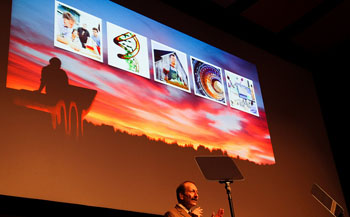Campus News
State of the Campus event spotlights community interactions
Chancellor George Blumenthal celebrated the achievements of this still-young university and described its regional and global impacts during a “State of the Campus” presentation to campus and community leaders.



UC Santa Cruz Chancellor George Blumenthal celebrated the achievements of this still-young university and described its regional and global impacts during a “State of the Campus” presentation to campus and community leaders on Monday.
While Blumenthal also expressed strong concern about dwindling state funding support for public universities in California, he began his presentation at UCSC’s Media Theater by reviewing a year’s worth of campus achievements, including UCSC’s third-place world ranking for the impact of its research.
“For our size, we’re a research heavyweight,” Blumenthal said, using the completion of the human genome in 2000, the recent partnering of UCSC with the National Cancer Institute to launch the Cancer Genomics Hub, and UCSC’s leading role in sustainable agriculture as examples.
He also mentioned UCSC’s role in the search for the Higgs boson, or so-called ‘God particle.’ The university took the lead on two key experiments, using instrumentation that faculty members and students built.
Also, UCSC developed advanced robotic surgery systems for medical research. “Here’s what I particularly love,” Blumenthal said. “Computer engineering professor Jacob Rosen developed this technology with the help of undergraduate students.”
Although Rosen spent years working on the project, he gave away the results to competing labs “because a common research platform means the whole field will advance more quickly.”
Among the other recent achievements Blumenthal cited: the re-opening of the expanded and renovated McHenry Library, the launching of the new Grateful Dead Archive, and the opening of the new biomedical sciences building. He also referenced UCSC’s community contributions, from organized beach clean-ups to local arts and cultural treasures, and described UCSC as a strong regional economic engine generating $1.3 billion in economic activity a year.
Blumenthal said the campus was living up to its ideals and staying on track to make even greater contributions — despite several years of massive reductions in state support, cuts have left the campus with fewer staff and teaching assistants as well as reduced funding for faculty and campus operations.
He also spoke in detail about Proposition 30, the November ballot initiative that — if approved by state voters — would protect the University of California from $375 million in new budget cuts.
If it goes into effect, it would bring about a temporary increase in the state sales tax of a quarter cent and increase personal income taxes on those who earn $250,000 or more per year. At UC Santa Cruz, the Alumni Council has endorsed the measure.
“In the near term, Proposition 30 could make or break us,” Blumenthal told a crowd of nearly 200 people. He said that 89 percent of the funds would go to K-12 schools and 11 percent would go to community colleges.
“Why does that matter to UCSC?” he asked the crowd. “By helping the state meet its obligation to fund K-12 education, Proposition 30 would free up funding for UC.”
If voters approve the measure, it would spare UC an immediate $250 million mid-year cut and an additional $125 million cut next year. “I can tell you right now,” he added, “if we lose that state funding, we will see a hefty mid-year tuition increase … It is not my place to tell you how to vote, only to encourage you to make an informed choice and to ask you to help get out the vote.”
Toward the end of his presentation, Blumenthal urged the audience to help UCSC in several ways. “First, share our story with your friends and family and co-workers. Second, vote. I can’t say that enough times.”
• For information about Proposition 30, including arguments on both sides of the ballot measure, please see this UCSC website.
• View a video of the State of the Campus.